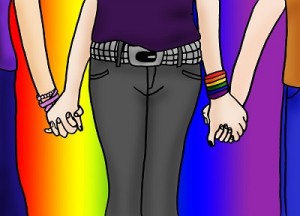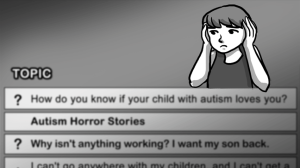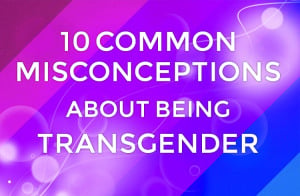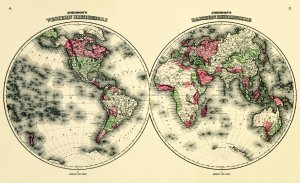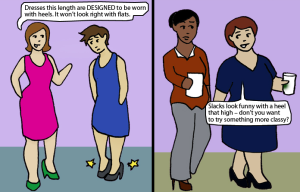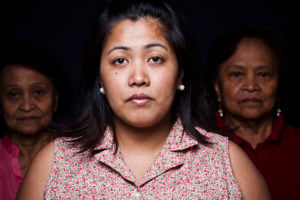
Credit: 90.9WBUR On Point
Trigger Warning: Eating Disorders (frank discussion, numbers, thinspiration).
For National Eating Disorders Awareness Week, and for Miss Representation, I made a vlog detailing the idea that although the media can (and does) affect body- and self-image, it cannot in and of itself cause eating disorders.
In the video, I make the point that eating disorders are a type of mental illness – key phrase – that affects thoughts and behaviors associated with food.
The important thing to note about eating disorders, I explain, is that they are “conditions defined by abnormal eating habits…to the detriment of an individual’s physical and mental health.”
That is, eating disorders are not diets.
But I realize now that saying that an eating disorder is categorized by a loss of self-control and an inability to think and behave rationally – because it’s a mental illness – isn’t enough.
We need to bust eating disorder myths and discuss how they’re different from diets – especially anorexia nervosa, which is categorized by restricting calories, just like a weight-loss diet is.
Because although poor body-image and diet culture are problematic in their own rights, anorexia nervosa takes on a whole new level of dangerous.
And yet, considering the way that we’ve normalized body-hatred and extreme dieting in our culture, it can be difficult to pinpoint when the former develops into the latter.
And when you consider that even the National Eating Disorder Association makes a distinction between the 50% of girls who use unhealthy weight control behaviors (such as skipping meals, fasting, smoking, vomiting, and using laxatives) and the 25% of those pathological dieters that will progress to developing full-blown eating disorders, it’s no wonder people are unsure of how to recognize the difference.
So let’s take a look at five subtle differences between dieting and anorexia in hopes of shedding light on this complicated issue.
1. Relationship with Food
Diet: Oh, I shouldn’t. I’ll feel guilty.
Anorexia: I literally cannot put that into my mouth, I’m so anxious.
When a person on a healthy diet is weighing their options regarding food intake, a pang of guilt may creep up when working out how they might feel later on.
“If I don’t stick to my meal plan, will I regret it later?”
This thought process isn’t necessarily problematic. Rather, it’s the same way that we feel whenever we do something that we feel is detrimental to our ultimate goals – because we understand that meeting goals means staying steady in our progress.
But a person with a healthy relationship with food isn’t going to spend days worrying about the intake.
Their emotional well-being isn’t at stake. They feel guilt, process it, and move on.
Eating disorders, on the other hand, don’t work like that. Instead of the possible guilt associated with goal-setting, eating disorders can cause chest-constricting feelings that accompany fear whenever food is around.
Rather than feeling a desire for the food and dealing with what the consequences (positive or negative) will be if it’s eaten, like a person on a diet thinks through, the feeling is of disgust and aversion, wanting to push it away.
2. Relationship with Weight
Diet: I want a slimmer figure.
Anorexia: I want to count my ribs.
There’s a reason why the novel Wintergirls by Laurie Halse Anderson is often quoted in pro-eating disorder communities. It is a brilliant, accurate look into the life of an anorexic.
Line after line is a perfect explanation of the internal struggle of eating disordered people. Want a quick glimpse into anorexia? Search the ‘wintergirls’ tag on Tumblr.
In the book, the narrator explains: “The only number that would ever be enough is 0. Zero pounds, zero life, size zero, double-zero, zero point. Zero in tennis is love. I finally get it.”
When people decide to go on a diet, it’s usually because they want to reach a certain goal weight, one that is within healthy range.
They want to lose or gain enough weight to achieve a look that they believe will suit them. Five, ten, twenty, fifty pounds.
When people have eating disorders, there is no goal weight.
Because 120 won’t be low enough. Reach 100, and you want 99. Reach 95 and you want 85.
“Just five more pounds, just five more pounds” becomes the mantra to an insatiable, unjustifiable need.
When people suffer from anorexia, they want to be weightless.
It’s the difference between wanting to look good in a bikini and wanting to walk in the snow without leaving a footprint.
3. Relationship with the Scale
Diet: You are an inanimate object that cannot measure my worth, only my progress.
Anorexia: Depending, you are either my best friend or worst enemy.
When I decided, about ten months ago, to buy a scale after not having one for years, I had a breakdown in the ‘BATH’ aisle at Target.
I had the same heartbreaking feelings attached had I been recalling a lost love – nostalgic for the triumphs and regretting the mistakes.
The difference between recognizing the scale as an inanimate object and personifying it as your best friend or worst enemy, depending on the number that it blinks back at you, is another distinction between dieting and anorexia.
People on healthy diets understand that a scale helps them record their progress.
People with eating disorders depend on scales for validation.
4. Relationship with Exercise
Diet: This makes me feel good, and it helps me achieve my goals.
Anorexia: I use this as a means of purging to punish myself.
“If I ate 500 calories today, how long do I have to run in order to burn it all off?” And, side note: “I feel disgusting.”
Scroll through the forums on any pro-eating disorder website and you can find pages and pages of the same kinds of questions.
Forgive me, Father, for I have sinned. How must I repent? How do I achieve rebirth? How do I rid myself of filth?
Going to the gym should be fun. It should be part of a healthy routine. It should be to work on your body out of love for your body, not out of sheer hatred.
Healthy dieting and its associated exercise is about feeling good.
Using the gym to purge is about feeling horrible.
Because there’s a difference between going to the gym to burn a couple hundred calories and forcing midnight treadmill sessions to punish yourself.
The question to ask is what’s your motivation? Are you going to the gym for health? Or are you going for attempted redemption?
5. Relationship with Brain
Diet: I have to follow my meal plan, but otherwise live a normal life.
Anorexia: Food controls me. It is at the center of my every thought.
When eating disorder specialists talk about the “preoccupation with food” symptom, they’re not kidding.
Some eating disordered people are so entirely fixated on food that some psychologists liken anorexia to a form of OCD – obsessively thinking about food and compulsively avoiding it.
Although food-centered thoughts also occur more frequently in people who are dieting, the difference is how much control those thoughts have over your life.
It’s the difference between paying attention to something that you haven’t before (like, say, calories or food pyramids) and not being able to think about anything else.
Because food – as well as fat and weight – is what an eating disordered person’s illness revolves around, so too can their lives.
Every second of every day is spent trying to work out how, exactly, to avoid something that healthy people can do without a second thought.
For an eating disordered person, food is less of an awareness and more of an obsession.
So Now What?
If you think that you might have an eating disorder – if, in reading this, you’ve recognized yourself more in that category than as a casual dieter – then check out NEDA’s free screening, which can help you determine if it’s time to seek professional help.
If you want more information about the signs and symptoms associated with different eating disorders (especially since I focused very specifically on anorexia nervosa), NEDA has a wealth of information and resources on their website.
But if you’re a casual dieter who might be teetering on the edge of disordered thought patterns and behavior, then keep an eye out.
Reflect on what your motivations and goals are. Try to develop more positive body image.
And if and when you need it, seek help.
Melissa A. Fabello is the Editor of Everyday Feminism, a feminist blogger and vlogger, as well as an online peer sex educator, based out of Philadelphia. Along with Everyday Feminism, Melissa also currently works with Miss Representation, Adios Barbie, and Laci Green’s Sex+ community. She is a second-year graduate student, working on an M.Ed. in Human Sexuality. She can be reached on Twitter @fyeahmfabello and book her for speaking engagements here.
Search our 3000+ articles!
Read our articles about:
Our online racial justice training
Used by hundreds of universities, non-profits, and businesses.
Click to learn more
Most Read Articles
- « Previous
- 1
- …
- 30
- 31
- 32







